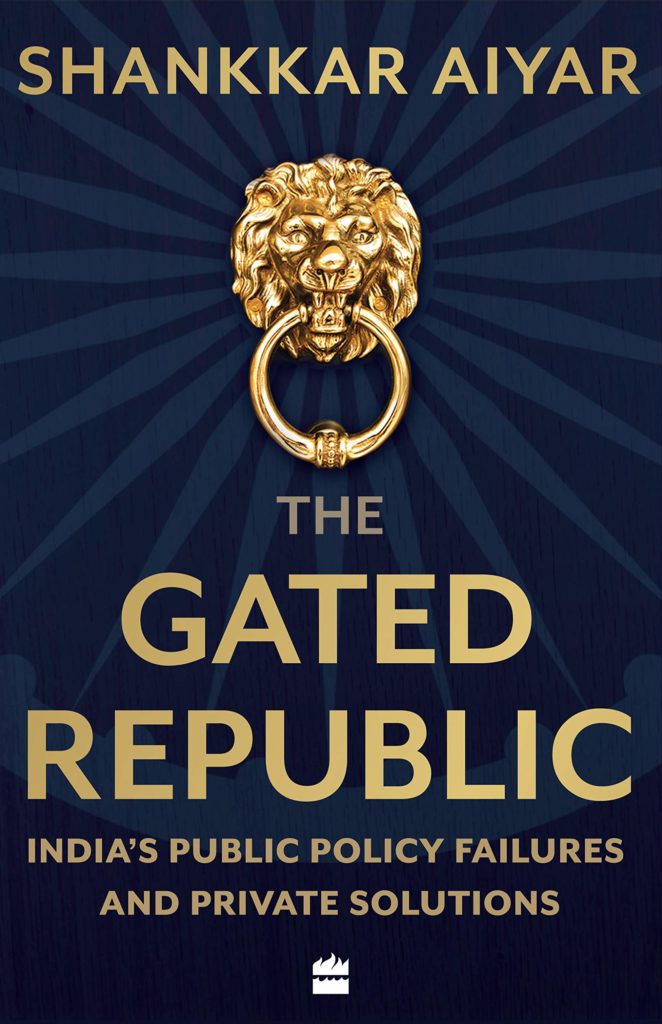The Gated Republic Review by Rama Bijapurkar
Why we are the way we are.
The stark commentary is an inquiry into India’s history and politics of public policy, and the anatomy of failure
A European anthropologist observed in the 1990s that in India, people are thought of first as consumers and second as citizens and nobody seems to have a problem with that characterisation. I remember thinking that it is because as a consumer you have far more rights than you do as a citizen. My mother yells at the water tanker man and berates him into delivering better service but she has no ability to even mildly do the same with the municipality.
Shankkar Aiyar’s book The Gated Republic answers the question of why this is so and how we came to this pass, and describes itself as an inquiry into the history and politics of public policy and the anatomy of failure. It is an acute commentary with evidence of how and why millions of Indians are “desperately seceding, as soon as their incomes allow, from dependence on government for most basic of services”. It is formidable—I would even say grand canyonesque—in its width, depth and sweep as it traces all the paths that got us to this sorry state.
It examines, with equal felicity, the big basic five issues of water, healthcare, education, electricity, and law and order, packing enormous amounts of diverse information, knowledge and anecdote in each. In anyone else’s hands, it might have been a dense and overwhelming read, and not the artful tapestry that it is. Besides, the book is done in a quintessentially Shankkar Aiyar way, with rapier sharp insight, laser-precision analysis, dollops of sardonic humour and delightful turn of phrase sparkling on every page. Not at all a surprise to readers of his columns or fans following him in other media.
ALSO READ | Shankkar Aiyar interview: It is delusional to think flyover economics answers public policy failures
I wouldn’t, however, say it is an easy read, because the stark commentary will make anyone who cares about India get angry, upset and sad in turns, as the same sordid stories repeat themselves in each chapter in different contexts. Perhaps that is the purpose of such a book. To do India a service by saying it like it is, leaving no fig leafs for even the most positive among us to hide behind and showing us how “millions (of us) have opted out after internalising the incapacity of the state to deliver”.
This is not a prescriptive book. Those who are looking for a 10-point solution to fix India’s failed public goods delivery system, please look elsewhere. This is also not a paean to “privatisation”, the way reform pundits think of the term. It does extol private players whose solutions have worked, but it also does recognise the bad privatisation where municipal corporations sell out to private parties like builders, and political education barons who dominate the education space.
It is a well-presented compendium of thought processes and business models behind private solutions that have scaled and plugged this gap, laced with acerbic comments of how some of these are “ironically propelled as a public policy solution by politicians”. While The Gated Republic and its endorsers seem to lean in the direction of the private sector being the messiah, in these Covid-19 times—where we are trapped between state services that are woefully inadequate in quantity and quality and private choices that are usurious or cherry picking in what they will do—it does seem that the jury is still out.
I have been mulling the “so-what” of this sobering but deeply insightful book. I take away a call to active citizenry like never before though the book does give me a feeling that all is lost already. I also take away the call to more private players to say look, enormous opportunities abound as Indians grow in their aspiration for a better life in the face of a spectacular failure of public goods. You can do good and get rich at the same time.
Published here by permission of the author, Rama Bijapurkar. Originally published in New Indian Express on 02nd August 2020 05:00 AM | Last Updated: 02nd August 2020 10:32


